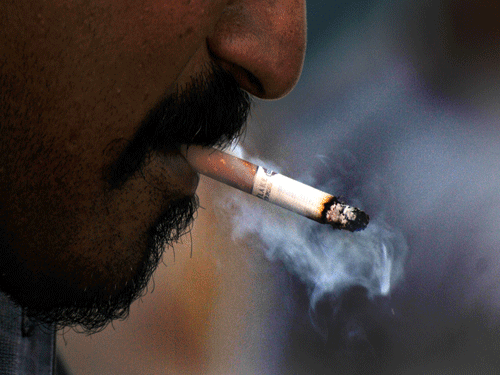
Less than a fortnight before tobacco firms are to make bigger the mandatory warnings on cigarette, bidi and chewing tobacco packets, a parliamentary panel has asked the Health Ministry to halt implementation of the same for the time being.
Last October, the Union health ministry issued a notification to ensure statutory health warnings are printed on both sides of the pack covering 85 per cent of the principle display area.
While 60 per cent of the area is to carry the visual image, the text of the warning would have to be printed prominently on the remaining 25 per cent area. The notification was to come into effect from April 1, 2015.
“The Committee strongly urges the government that implementation of the notification may be kept in abeyance till the panel finalises the examination of the subject,” the Committee on Subordinate Legislation headed by Lok Sabha MP Dilip Kumar Mansukhlal Gandhi said in its report tabled on Wednesday.
The panel said it received representations from seven Parliament members and stakeholders like All India Bidi Industry Federation and Karnataka Virginia Tobacco Growers Association expressing apprehension on the new rule.
The industry argued that the increase in the size of the health warning from 40 to 85 per cent was arbitrary, excessive and unreasonable, which would lead to the collapse of bidi industry.
There are apprehensions on the loss of income for 38 million people dependent on the cultivation and sale of tobacco.
One of the arguments against the 85 per cent warning rule is that it would be difficult for the consumer to distinguish the original from fake products. As a result, illegal cigarette-making business will proliferate.
Representations argued bidi is a “natural product” as it uses tendu leaves. Two million tribals pluck these leaves from forests, which give them a remuneration of about Rs 1,100 crore per year. More than 1.3 crore people are directly dependent on bidi business.
Moreover, in the conical packs of bidi, there would be no space to print all statutory messages required under various laws in the 15 per cent space.
The House panel opined that since the socio-economic effect on the livelihood of the workers associated with the tobacco industry trespasses the domain of the Health Ministry, it would be imperative to seek the views of the labour and agriculture ministry, which would take some time.